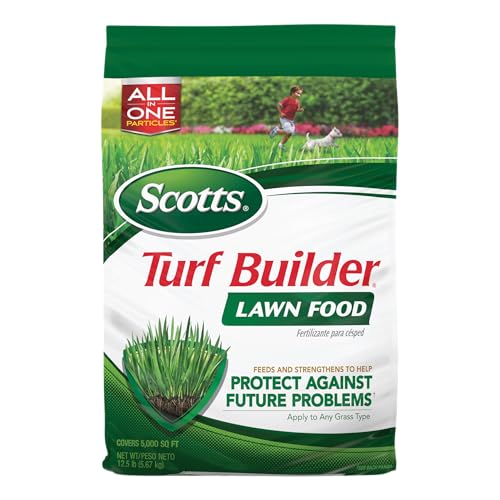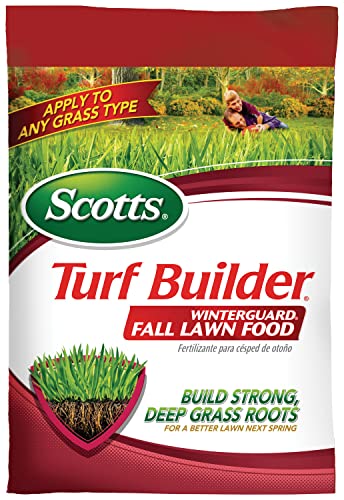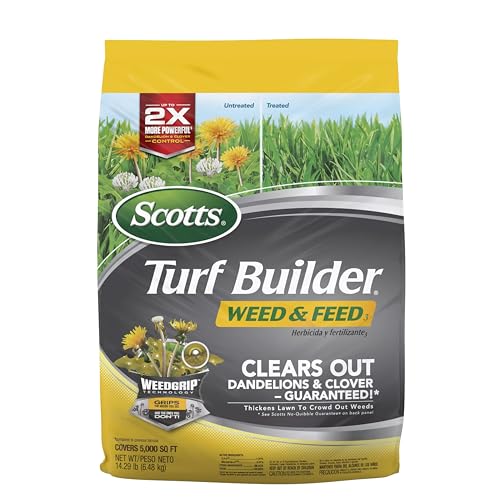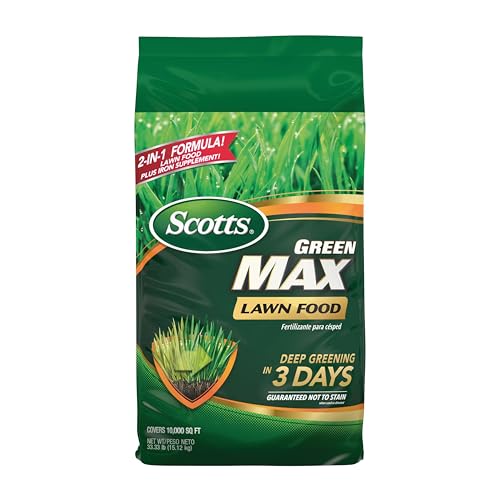The Best Lawn Fertilizers
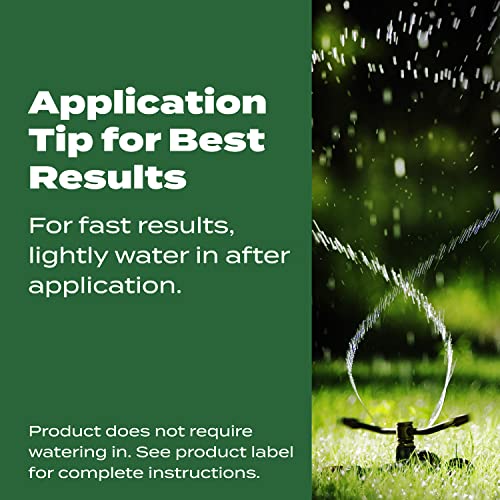
To help you find the perfect lawn fertilizer, we continuously put forth the effort to update and expand our list of recommendable lawn fertilizers. Our team collects, edits and publishes new information, in order to present it to you in an accurate, significant and neatly arranged way.
Our Picks
8 More Lawn Fertilizer Alternatives
Table of Contents
Buying Guide
The nutrients your lawn needs
All plants need a combination of three nutrients: nitrogen, phosphorus, and potassium. Every fertilizer has a certain proportion of these nutrients, and different nutrients are important for different things. Nitrogen is important for growth, phosphorus encourages flowers and roots to grow, and potassium is a supporting nutrient.
The percentage of each nutrient will be listed on any fertilizer that you buy. It will look like three numbers, such as 18-6-12 or 5-10-5. The first number stands for nitrogen, since it’s the nutrient your lawn needs the most. The second number stands for phosphorus, and the third stands for potassium. Thus, these numbers are often called the “N-P-K ratio.”
Don’t worry, though — you don’t need to calculate the proper ratio of nutrients on your own. Different ratios are appropriate for broad categories of lawns — for example, a certain N-P-K ratio may be suitable for a specific age of grass, season or geographic location.
Here are some basic guidelines to go by:
For a new lawn, you’ll need more phosphorus to encourage the young grass to produce hardy roots. That means you want more phosphorus, so you want a fertilizer with more phosphorus and potassium than nitrogen. That means you want the second and third number to be bigger than the first. Think of this as a “small-big-big” ratio.For an established lawn, you need more nitrogen than anything else. You need a “big-small-small” ratio.
A stressed lawn that’s preparing for extreme cold, frost or drought needs extra potassium — these are sometimes sold as “winterizing” fertilizers — so you need a “big-small-big” ratio.
Note that too much of one nutrient can throw your lawn out of balance in addition to being extremely harmful to the environment. If you’re in doubt about what your own lawn needs, never hesitate to ask a gardener.
Organic or synthetic?
Lawn fertilizers can be divided into two main types: organic and synthetic. Organic fertilizers are made of natural materials like cottonseed, seaweed, blood meal, green sand or alfalfa. These are high-nutrient ingredients that are found naturally and processed for you to use on your lawn. Organic fertilizers work especially well as a year-round, regular solution. They won’t work quite as well as a fast-acting solution to a dehydrated lawn, because they’re made of natural materials that take time to break down into the soil.Synthetic fertilizers are also known as chemical fertilizers. They’re most commonly found in garden and lawn stores. They’re usually in granular or pellet form (more on that below), and they’re usually more potent and fast-acting because they contain concentrated forms of specific nutrients. For the same reason, they can more easily be tailored to specific uses since the N-P-K ratio can be manipulated to whatever is necessary for a particular season, plant or location. Chemical fertilizers can be useful in ways that an organic fertilizer is not: for example, if you need immediate nutrient flow, then a synthetic fertilizer can work well in the short-term.
However, synthetic formulas can also be dangerous for your lawn. Their effects are short-lived, and they diminish the fertility of the soil itself making it necessary to keep fertilizing over and over for the same effects (which is harmful for the environment).
Keep in mind that, while organic fertilizers are better for the environment in many ways, too much fertilizer is harmful no matter where it comes from. Organic fertilizer can be a pollutant, too!
Granular, pellet or water-soluble?
Fertilizers also come in different formulas. Many synthetic fertilizers come in pellet form and must be deposited onto the lawn and then released into the soil. Organic fertilizers often come in granular form. Other fertilizers come in liquid or water-soluble form. Pellets take time to dissolve into the soil, while water-soluble fertilizers dissolve rapidly. Either one of these formulas can be relatively easy to disperse over large distances.Time-release, gradual release or manual release?
Some granular fertilizers are timed so that they automatically re-release their nutrients without needing to be reapplied. There are also gradual release fertilizers that release their nutrients slowly over a period of time, which helps prevent the nutrients from “burning” the lawn by adding too much of one nutrient at once. This will also help prevent the fertilizer from leaching away into the soil.Manual release fertilizers are simply fertilizers that you add by hand or with a hose.
This category is mostly up to personal preference, though often certain types or brands of fertilizers only come in one formula. In specific cases, however, one formula can be especially beneficial. One main tip is that if you choose to go with a synthetic formula, you should make sure to buy a gradual release fertilizer, which will counteract some of the potentially harmful effects or chemical fertilizers described above.
How much? How often?
The amount of fertilizer that you should apply is completely dependent on the N-P-K ratio of the ingredients. If you’re using a nitrogen-heavy fertilizer, for instance, you don’t want to apply too much too quickly or you could damage your plants. This is true for all of the nutrients, in fact. The easiest way to get this right is to read the package’s label carefully, and follow the directions.As far as how often to fertilize, the answer is dependent on your lawn and the fertilizer, but a good rule of thumb to follow is “not too often.” It’s better to use a gradual-release fertilizer than to over-apply.
Leave your clippings
A bonus tip: you can save money on fertilizing your lawn by leaving the clippings on the grass when you mow it. Usually you need to compost raw material before it will be of any use to plants, but in this case the combination of dried leaves and fresh glass clippings gets the job started for you. This method will improve the health of your soil and allow you to fertilize less often. This technique is also known as “grasscycling.”Your lawn, your choice
Ultimately, the decision about which fertilizer to buy is up to you. Everybody makes mistakes with their lawn at some point. It’s part of the learning process, so try not to stress too much and trust your own senses. With a bit of basic knowledge, some highly recommended products and the willingness to ask for help, you’ll eventually find the lawn of your dreams.Top Rated Lawn Fertilizers
If you're looking into finding the best rated lawn fertilizer, you should probable check out the Scotts Turf Builder Food. We looked at various sources of reviews and found this one to have the best mix between review count and average rating stars.
The Lowest Price We Could Find
Often, going for the best price is a simple but good option. With a price of $18.10 (last checked this morning), we do not list any other lawn fertilizer cheaper than the Scotts Turf Builder WinterGuard Fall Fertilizer. Just remember that it's not always the best option to go for the cheapest one.
The Lawn Fertilizer With the Most Reviews
With at least 637 reviews and counting, the Scotts Turf Builder Weed & Feed3 might be another option to consider. This large amount of reviews signalizes that many people are using it, with most of them beeing satisfied.
High Quality Lawn Fertilizers
It's quite rare that the saying "You get what you pay for" turns out incorrect. If you have the money on the sideline, feel free to choose the most expensive item from our list: The Scotts Green Max Food currently sells for $66.99.
The Lawn Fertilizer With the Most Clicks
If you trust us and our users, feel free to check out the Scotts Turf Builder Food. Our statistics say that it is the most favorite Lawn Fertilizer from the list above.
Our Bestseller
If you're still undecided, I would recommend that you go with the masses and choose the top selling lawn fertilizer: The Scotts Turf Builder Weed & Feed3 is the hottest bestseller in this category right now.
Lawn Fertilizer Reviews
Further Reading on Lawn Fertilizers
Research
Statistical comparisons of 2008 surface water quality data with a historical data set at weekly and subweekly resolution revealed statistically significant reductions in total phosphorus (TP) and a trend of reduction in dissolved phosphorus following implementation of a …
A high nitrogen containing clear liquid fertilizer including phosphorous and potassium in a ratio suitable for use as a lawn fertilizer wherein the solution has a pH within the range of from 7.5 to 8.7 and has a cloud point of less than 45* F and a clearing point of less than 65 …
Transport of nutrients (primarily forms of nitrogen and phosphorus) to lakes and resulting accelerated eutrophication are serious concerns for planners and managers of lakes in urban and developing suburban areas of the country. Runoff from urban land surfaces such …
Useful Videos
More people are searching for natural, organic lawn fertilizers, but the term organic has often been misused. In this video Doc talks about the new organic ...
Comments
About this Article
It was last updated on 2026-01-27 08:15:03 and has been viewed 9128 times.
